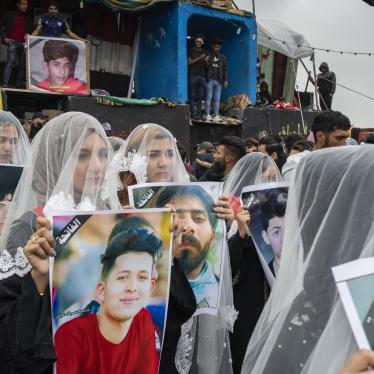October 15 was supposed to be a happy day for the families of imprisoned Yemeni journalists Abdul-Khaleq Amran, Akram al-Walidi, Hareth Humaid and Tawfiq al-Mansouri. A prisoner exchange deal was set to take place between the Houthi armed group and the internationally recognized government of Yemen in which more than a thousand people were to be released.
The families had longed for years to be reunited with their loved ones and expected to see them among the released prisoners, but by the end of the day their hopes had turned into disappointment and fear.
The four journalists, who worked for various local media outlets, have been arbitrarily detained since 2015 by the Houthi authorities, apparently for reporting on abuses by the Houthis as the armed group took over the capital, Sanaa, and much of western Yemen in September 2014. At the time, the Houthi armed group was waging an aggressive campaign to silence journalists. In 2016, Houthi leader Abdel-Malek al-Houthi made clear his hostility towards independent media by declaring in a televised speech that “media workers are more dangerous to our country than the traitors and mercenaries of security forces”.
In April 2020, the Houthi-controlled Specialized Criminal Court in Sanaa sentenced the four to death following an unfair trial on politically motivated charges of treason and spying for foreign states, based solely on their media work. The court did not specify a date for carrying out the sentence.
Apart from the threat of execution, there are serious concerns about the conditions in which the four men are held. Three other detainees who were detained, held, and put on trial with them were released in the prisoner exchange. They told Human Rights Watch that they were held in a freezing, filthy windowless cell of about six square meters with several other men.
The former prisoners also said they feared that the Houthi authorities may execute the four journalists soon, since they were not included in the prisoner exchange.
Despite countless appeals by human rights and media freedom groups in Yemen and abroad to reverse the death sentences and release the journalists, the Houthis have not budged.
Meanwhile, the agony for the jailed men and their families continues. Days after the prisoner exchange deal, family members described their frustration and pain because they are unable to help their loved ones as their health deteriorates without access to adequate medical care.
The fathers of al-Mansouri and Humaid were denied by the Houthis the right to visit their sons in prison and died without saying goodbye to them. The family members are pleading with the Houthis to let them out before their mothers also pass away with broken hearts.
Journalism should never be a crime, much less lead to the death penalty. To halt this potential tragedy, key international actors such as the United States and European countries, as well as countries allied to the Houthis, should press for the immediate release of the four journalists.
We have seen pressure work in previous cases, including an international campaign in 2017 that helped secure the release of Yemeni journalist Yahya al-Jubaihi, even though a Houthi-controlled court had issued a death sentence against him for being a “Saudi spy”. The campaign also helped obtain the release of Hisham Tarmoom, Haitham al-Shihab and Essam Amin Balgheeth as part of the October prisoner exchange.
The Houthis are not the only group mistreating and detaining journalists in Yemen. In 2018, the Committee to Protect Journalists reported that media workers in Yemen are under attack from all warring sides and face arbitrary arrest and abusive treatment even in areas controlled by Yemen’s internationally recognized government.
Parties to the conflict need to allow journalists to practice their profession freely. Yemen’s humanitarian disaster is reaching catastrophic proportions and it is the job of media workers to document and inform of its devastating effects. To be able to do that, their safety and security need to be guaranteed.
The Houthis can take the first step in the right direction by reversing the death sentences against the four journalists and releasing them from prison.






